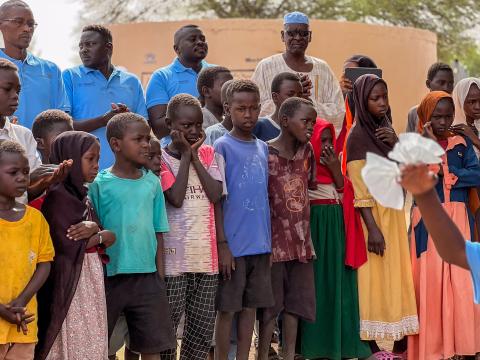Lives Hang in the Balance as Sudan Refugee Crisis Reaches Catastrophic Levels

20 June 2025, Port Sudan: The Sudanese refugee crisis has reached a catastrophic level, threatening to spiral into an irreversible collapse without immediate and substantial global action, World Vision has warned.
Millions are displaced both within Sudan and across its borders into nations like Chad, Central Africa Republic, South Sudan, Ethiopia, and Uganda. Since April 2023 nearly one million children crossed borders seeking safety in the neighbouring countries. Over 3.8 million people have fled Sudan to neighbouring countries, joining the nearly 13 million internally displaced within Sudan.
These individuals have fled unimaginable violence, the destruction of their homes and the constant threat of acute food insecurity, disease, and exploitation. This influx places an enormous strain on already vulnerable host communities and limited resources in neighbouring nations.
On this World Refugee Day, World Vision urges the global community to stand in unwavering solidarity with Sudanese refugees. The humanitarian response to the Sudan crisis, particularly for refugees in neighbouring countries, is severely underfunded, directly jeopardising the ability of organisations like World Vision to provide life-saving assistance and foster dignity and resilience.
Refugees often cross borders and arrive with nothing, desperate for basic necessities such as food, clean water, sanitation facilities and adequate shelter. Access to healthcare and education is also severely limited in internally displaced camps in Sudan and refugee campsimpacting their well-being and future prospects. Malnutrition, especially among children, is a pervasive and alarming issue with 3.2 million children, under the age of five, projected to suffer from acute malnutrition in 2025.
The number of unaccompanied children in refugee camps is increasing daily.
Twelve-year-old Mortada's story from Wedweil refugee camp in Aweil, South Sudan is a reminder of the human cost of the displacement crisis. He fled South Darfur, losing his father before his eyes and unsure of his mother and sisters' whereabouts. Wedweil camp, which hosts 25,000 refugees, including South Sudanese returnees, is now severely overcrowded. "I am living with a woman whom I don’t know, but she is taking good care of me. I do not go to school; I sleep on the ground. I do not have peace, as I do not know where my family members are," Murtada shared, with evident distress.
Beyond physical hardships, Sudanese refugees carry immense psychological and emotional burdens. Witnessing and experiencing violence, loss, and displacement leaves deep scars, particularly on children. Access to mental health and psychosocial support is critical, yet tragically scarce.
The severe funding gap is threatening the lives of vulnerable Sudanese refugees. Without immediate and substantial additional funding, the consequences are dire:
A generation is losing the right to education: Children, already deprived of schooling due to the conflict, will continue to miss out on education, jeopardizing their future and perpetuating cycles of poverty and instability. Education serves not only as a tool for learning but also as a means of protection for children.
Food insecurity is worsening: Many refugees already receive reduced food rations, with irregular distribution cycles. Without additional support, widespread malnutrition and famine will become a grim reality, particularly for children and pregnant or breastfeeding women.
Disease outbreaks are escalating: Overcrowded camps with inadequate access to clean water, sanitation, and healthcare are breeding grounds for deadly diseases like cholera, measles, and acute watery diarrhea. Underfunding means that essential medicines and health services are scarce, turning what would otherwise be preventable illnesses into fatal ones.
Protection services are crumbling: Women and children are at heightened risk of gender-based violence and sexual assault. Without adequate funding for protection programs, these vulnerable populations are left defenseless.
Shelter and basic necessities are deteriorating: Many refugees are living in inhumane conditions in spontaneous settlements or overcrowded camps, lacking even the most basic shelter, clean water, and hygiene supplies. Further funding cuts exacerbate these conditions, and with the rainy season approaching, lives are at even greater risk.
The international community must recognise the immense gravity of the Sudanese refugee crisis. Lives hang in the balance. “Failing to provide additional funding now will condemn millions to an even more desperate fate, turning a dire situation into an irreversible catastrophe,” said Simon Mane, World Vision's Sudan National Director and Sudan Crisis and Migration Emergency Response (SCRAMER) Director. “We must act swiftly and decisively to avert further loss of life and ensure that Sudanese refugees receive the vital humanitarian assistance they desperately need and deserve.”
World Vision Sudan is actively on the ground, both in Sudan and in refugee-hosting countries, through the multi-country response, providing vital assistance, including food aid, cash assistance, water, sanitation and hygiene (WASH) services, health and nutrition support, and child protection programs. We emphasize the importance of ensuring safe and unhindered access for humanitarian agencies to reach those most in need.
ENDS.
For further information please contact:
Grace Mavhezha, Communications, Advocacy and Public Engagement Manager, World Vision Sudan: grace.mavhezha@wvi.org
World Vision is a Christian humanitarian organisation dedicated to working with children, families and their communities to reach their full potential by tackling the root causes of poverty and injustice. World Vision serves all people, regardless of religion, race, ethnicity or gender.
For more information, please visit www.wvi.org